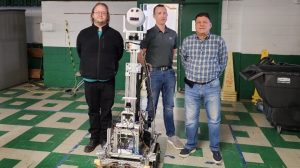 The use of autonomous mobile equipment such as robots and drones for inspecting substations is a technical innovation potentially changing the way the power industry operates through increased accuracy, efficiency, and workforce safety.
The use of autonomous mobile equipment such as robots and drones for inspecting substations is a technical innovation potentially changing the way the power industry operates through increased accuracy, efficiency, and workforce safety.
TVA recently investigated the technology by completing a pilot project with the Electrical Engineering Department at Tennessee Tech University (TTU) to develop a first-generation prototype robot that could potentially be used for substation inspections.
TTU graduate students worked with TVA to develop the prototype, into which Lidar mapping technology was downloaded to create a digital map of the substation yard.
“We learned that geospatial technologies don’t always work in substations, so we had to focus on Lidar,” said Matt Crocker, Manager Transmission Network and Telecom Operations. “We realized the height of a robot is critical when the one we developed couldn’t see to the height necessary to take measurements.”
The pilot also illustrated other challenges, like designing a robot that can travel over the rough terrains often found in substations.
“In the end, we learned that developing an efficient robot for this use is complex and perhaps best left to the industry – but it was critical for us to evaluate these criteria before purchasing equipment for TVA’s system in the future. We’ll continue to evaluate this technology for use in substations,” said Michael McAmis, Senior Program Manager Grid Research Development, Innovation and Research.
Although the prototype robot was donated to the University and won’t be used by TVA, the experience of designing one from the ground up was valuable, helping to identify what design elements are needed in mobile inspection devices for substations and what challenges could be encountered when robots are deployed on a larger scale.
The project was also a win for TTU students, who had developed an algorithm for the machine to automatically learn its surroundings years before AI was as prevalent as today. The University has applied for a patent for algorithms and other design learnings can be translated into future projects, such as in developing medical assistance equipment like electric wheelchairs.
“Our partnership with Tennessee Tech is an example of the importance of working with academia to explore innovative solutions for problems,” said Matt.
Other pilot projects exploring the application of autonomous mobile technology in which TVA is engaged include:
- Ongoing work with Mississippi State to develop beyond the line of sight drones for use on the TVA system.
- Working with Electric Power Research Institute (EPRI) on drone docks that live in substations.
- Exploring off the shelf robots with EPRI.
